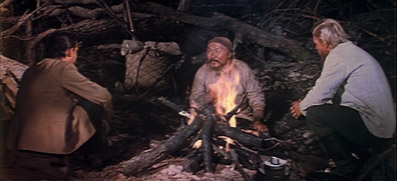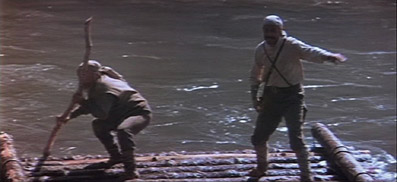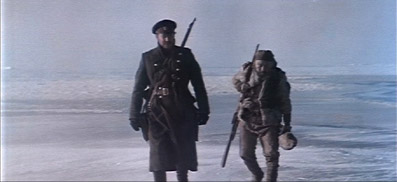|
It
remains a peculiarity of cinema history that the films of
Kurosawa Akira, revered for so long throughout
the world, were once held in rather low regard in his own country,
so much so that by the late 60s, funding for his films was becoming increasingly hard to secure. In 1967, a co-production
was announced between Kurosawa Productions and 20th Century Fox to produce
Tora! Tora! Tora!, a recounting of the
attack on Pearl Harbour that would present the story from both the American and Japanese perspectives.
Kurosawa began work on the Japanese half of the film but the American studio was apparently not happy with the results and the director ultimately left the project. The task of shooting the Japanese section of
the film eventually falling to Fukasaku Kinji.
In
1970, Kurosawa's comparatively low-budget but very personal story
of lives of a group of Tokyo slum dwellers, Dô
desu ka den, became the first production
of The Committee of Four Knights, a group founded by Kurosawa
along with fellow directors Ichikawa Kon, Kobayashi Masaki and
Kinoshita Keisuke. They were keen that their first film
should be a hit. Unfortunately, it wasn't. On 22nd December 1971, the man
many regard as the greatest of all film directors attempted
suicide by making six slashes to his throat and eight to his wrists. Fortunately for him, for his friends and family, and for film history, the attempt
did not prove fatal.

In
1973 Kurosawa began work on Dersu Uzala,
a co-production with Mosfilm Studios to be shot in Russia
and in the Russian language, the director's first non-Japanese
film. What could have felt like the result of enforced compromise – Kurosawa had to leave his home country to get a film made – turned into a triumph.
The film won two major prizes at the Moscow International
Film Festival and the Oscar for Best Foreign Language Film.
Five years later, with financial assistance secured
in part by longtime fans George Lucas and Francis Coppola, Kurosawa made
Kagemusha, one of his most widely celebrated
works and a Palme D'Or winner at Cannes. Perhaps even more
significantly, it scooped a number of major awards at Japanese festivals.
Based
on the memoirs of Russian explorer Captain Vladimir Arseniev,
Dersu Uzala tells of his 1902 surveying
expedition as head of a small company of soldiers in the
Ussuri basin close to the Russian border with China. One
night, the group make camp and sit around the fire to eat when they are joined uninvited by an old hunter named Dersu Uzala.
The soldiers laugh at his pidgin Russian and his woodland
wisdom, but Vladimir decides to hire Dersu as a guide and the
soldiers' initial mockery subsides as they begin to learn
from and respect the man. When Vladimir and Dersu
venture into the icy Siberian wastelands and lose their
way, it is Dersu's quick thinking and determination that
saves their lives. Three years later, the Captain leads
another surveying group into the area and searches for his
old friend, with the hope of persuading him to come and
live with his family in the town of Khabarovsk.
If
you come to Dersu Uzala exclusively from
Kurosawa's samurai films then you'll probably be ill-prepared
for what you get, a gently paced, almost action-free
character study, filmed largely in long shot with only occasional
shifts to medium close-up, and with precious few of the exhilarating
tracking shots that you'll find in the director's visually
busier works. Where there is a clear connection with earlier films in this director's extraordinary oeuvre is in the underlying humanist
thrust of its story, a theme that you'll
also find in films as diverse as The Quiet Duel
(1949), Ikiru (1952), Seven
Samurai (1954), I Live in Fear
(1955), Dô desu ka den (1970) and
the later Dreams (1990). It's an element
very much to the forefront here, with the added irony that a professional solder learns from a woodland hunter –
two men for whom a rifle part of their identity –
to live and let live. It is clearly intentional that the
only injuries inflicted by their weapons, one of them indirectly,
are the result of accident rather than deliberate action. The conservationist message extends beyond the destruction
of the Siberian woodland to the wildlife and even the forest
inhabitants, Dersu included. The hunter despairs at the
mass trapping of animals by the Chinese Hunhutsi and is
bemused by a desire to hunt more than you can eat. But Vladimir's
offer of a home away from the forest for his friend, no
matter how well intentioned, is equally disruptive to the
natural cycle.

The
developing and sustained friendship between Vladimir and
Desu is the dramatic core of the film, and although such a relationship may not be new in itself, it is handled with rare
level of subtlety and emotional depth. The lead performances
are key to why this works as well as it does, with Yuri Solomin displaying
impressive restraint as Vladimir and Maksim Munzuk delightfully low-key as
Dersu, a role that would have allowed many a character actor
to chew the scenery. He's easy to engage with, a societal outsider
in complete harmony with his surroundings,
one whose knowledge and wisdom comes not from verbal or
literary instruction but from the basics of everyday survival. In spite of their training, the soldiers have none of Dersu's experience
with the land, its animals or its people, and even when
they save him from a possible watery death, they are able to do so only by following his instructions. That they learn so much from him, perhaps
without even realising, is perhaps the film's most positive
message of hope for future generations, which is in no way eclipsed by the tragic
turn the film take in its later stages.
Kurosawa
seems as much at one with his locations as Dersu himself,
highlighting their beauty without over-glamorising them, with the opening shots of the forest, accompanied as they are by Isaak
Shvarts' sometimes haunting score, recalling a similar location overview in Werner Herzog's Aguirre:
The Wrath of God. The unhurried pace feels absolutely
right for the story, and when incident leads
to urgency – as with the gripping fight for survival on
the Siberian ice or Dersu's rescue from the river – the
tension is effectively wound up without serious adjustment
to the pace or style.
Dersu
Uzala is in all respects a masterful and sometimes
beautiful film, handsomely photographed by a trio of cinematographers
(Fyodor Dobronravov, Yuri Gantman and Nakai Asakazu, the last of whom who
also worked on Kurosawa's later Ran) and
telling a moving and involving humanist story
of the meeting of two men in a landscape that, as Vladimir learns, deserves to be treated on equal terms to his companion, and to command similiar respect.

Final
point: it has been suggested in a number of quarters that
Dersu himself, a wise old man in the woods dressed in ragged
clothes and with a singular way of speaking, was an inspiration
for Yoda in the Star Wars films. It's not
hard to see the connection, especially when you consider
how much of a fan of Kurosawa's work George Lucas was and is, and that the characters of R2-D2
and C-3PO were based directly on
the two thieves in Kursosawa's 1958 The Hidden Fortress.
Oh...bugger.
When I first heard that Artificial Eye were releasing a
2-disc DVD of Dersu Uzala, I could hardly
contain my excitement, the idea of seeing the film restored
to close to pristine condition being a Kurosawa fan's
dream. This was, after all, the only film made by Kurosawa that was shot on 70mm. Maybe, just maybe, I got my hopes up too high.
Now
I should state before continuing that the package here is
a licence of a Russian Cinema Council title, from
whom Artificial Eye also sourced Solaris
and War &
Peace. The latter contained a restoration job
from severely compromised original material and the imperfections
were understandable. Now I'm starting to wonder
if I was right to be so forgiving. To
put it bluntly, the picture here falls a long, long way
short of my hopes and even expectations. At its best (exteriors
in sunlight) it looks rather good, and there
are almost no signs of dust or damage throughout, but for
the most part the image is soft and is often lacking in the area of fine detail,
with noticeably muted colours and black levels that vary
from shot to shot. Watching it again on an LCD monitor I
could see what looked suspiciously like video scan lines,
which suggests this was sourced from tape rather than film.
But
the biggest problem is a constant flickering of brightness
and contrast (and sometimes colour), that at worst looks
almost as if the film has been dropped in some damaging chemical
before the transfer was made (this is something that cannot
be shown in the screen grabs.) There was a similar problem
on War & Peace, but I made allowances
there due to the restoration issue, but it's every bit as
bad here and, in one scene set in fog, actually looks a
little worse. I found this, coupled with the other imperfections,
severely distracting, and simply cannot believe that more
could be done to make an internationally acclaimed, award-winning
film from one of the world's greatest directors made in
1975 (the very period that prints of martial arts movies were
being so mistreated in Hong Kong, only to be recently restored
to near-perfection by Hong Kong Legends) look better
than it does here. The fact that it was released some years
ago on laserdisc by Criterion in apparently far better condition only drives a spike into the wound.
The
original mono sound from the 35mm print has not been included here, only a 5.1
remix, quite possibly sourced from the 6-channel track that accompanied the 70mm screenings. Thankfully it's a good one – clear, glitch free and
with very specific use of the surrounds, with some nicely
inclusive weather effects. Whether it's true to Kurosawa's
original intent is another matter entirely. An English language
dub is also included and it's surprisingly tolerable as
these things go.
Both
the film and the extra features are spread over 2 discs.
Why? Good question.
Disc
1
Vladimir
Arseniev (0:59)
Archive footage of the real Vladimir Arseniev, which would
be interesting if it ran for more than a minute.
Making
the Film (4:49)
A Russian produced short on the making of the film with
brief but interesting behind-the-scenes footage. Not long
enough, though.
Photo
Album
12 production photos, presented as thumbnails that can be
selected and enlarged.
Disc 2
Y
Solomin is Speaking
An interview with Yuri Solomin, the actor who played Vladimir
Arseniev. This is subdivided into three parts – About
the writer Vladimir Arseniev (4:47), About
the director Akira Kurosawa (9:04) and Making
the Film (6.55) – and is the most substantial
extra on either disc. Solomin talks engagingly about the
town of Arseniev and the memorial there to the explorer
and his hunter friend, landing the role in the film and
the long-term friendship that developed with Kurosawa, amongst
other things.
There are also Filmographies for
ten of those involved in the production.
Oh
man. A marvellous film that has not received the treatment it deserves on this DVD, the transfer making
it look like a lost film from the 1950s rather than an Oscar-winner
from the 70s, and quite why it's spread over 2 discs is
beyond me. It may well be that we're looking at the best
print the Russian archives have available, but I can only
hope a better one comes to light and someone of the likes
of Criterion get their hands on it.
The Japanese convention of surname first has been used for all Japanese names in this review.
|